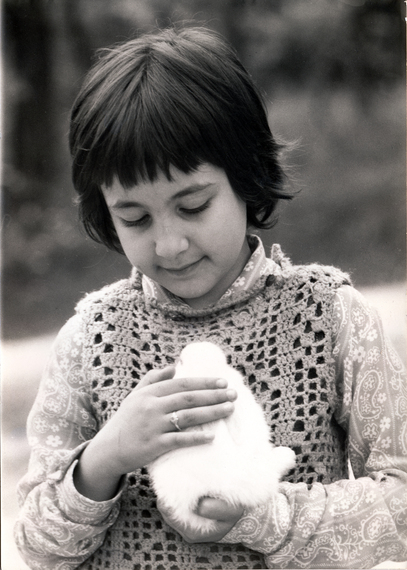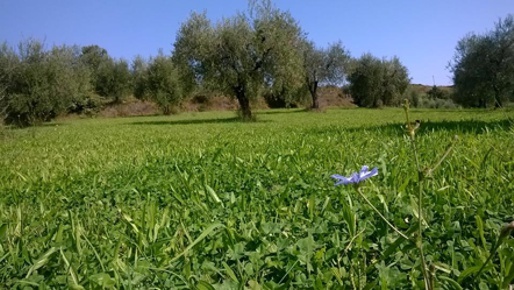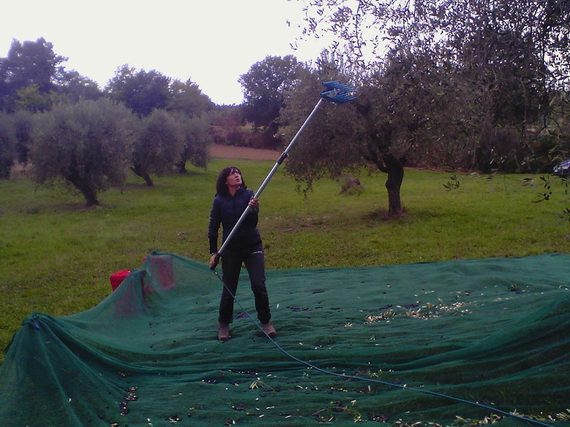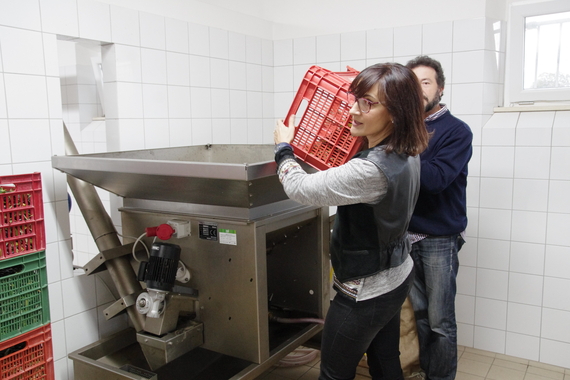I was feeling a little down a few days ago. Living so far away from Canada, from home, is still not easy, even though twenty-seven years have gone by since I came to Italy. Life here has always been a struggle, and I never managed to fully adapt. I feel torn between all the beauty hemmed into this tiny peninsula and a mindset that is light years apart from my own.
However, I don't want bad impressions to prevail by generalizing. There are good people here, people who are trying to salvage traditions and customs that have been sadly forgotten over the recent past. Slowly, Italians are beginning to realize that progress is not about mimicking cultures that belong to other countries, rather it is about preserving, respecting and nurturing the natural resources we are fortunate enough to have.
My friend, Elena, is one of these people. I love going to visit her out in the country. I love driving along the Aso river in pursuit of golden and green fields tucked between the folds of valleys and sky toward a nearby town called Moresco. When we greet one another, I call her super mom because she has five children, four of which are boys! As a full-time mom, you're probably thinking she doesn't have the energy to do anything else in life. Well, you're wrong. Elena runs her own business, an Italian style farm. She produces extra virgin olive oil, wine, honey, jams and chickpeas. All the best of the Mediterranean belt!
During the month of November, Elena and her husband Ferdinando are busy gathering olives from the trees in their grove. They do so every day until all the branches have been gently cleaned. When night falls you can find Ferdinando and his co-workers awake and busy in the mill. At the break of dawn, the olives collected the day before become one of the best extra virgin olive oils I have ever tasted. Today, modern equipment and machinery are used to run the mill, but when Elena and her husband's grandparents governed the land, things were very different. All the work was done by hand, and the olives were ground into oil after being crushed by a heavy grindstone that had to be pushed for hours.
The farm Elena manages, with the help of her family, was passed down from one generation to the next. It was first founded in 1938 by Nonno (grandfather) Domenico who loved his land and had great passion for his work. I don't believe he ever imagined that all the beneficial qualities the products of his farm gave to mankind would one day be threatened by climate change and pollution.
In fact, the output of Italian land represents a model of human nutrition known as the Mediterranean Diet and was declared to be an "Intangible Heritage" by UNESCO who states:
The Mediterranean diet constitutes a set of skills, knowledge, practices and traditions ranging from the landscape to the table, including the crops, harvesting, fishing, conservation, processing, preparation and, particularly, consumption of food.The Mediterranean diet is characterized by a nutritional model that has remained constant over time and space, consisting mainly of olive oil, cereals, fresh or dried fruit and vegetables, a moderate amount of fish, dairy and meat, and many condiments and spices, all accompanied by wine or infusions, always respecting beliefs of each community.
However, the Mediterranean diet (from the Greek diaita, or way of life) encompasses more than just food. It promotes social interaction, since communal meals are the cornerstone of social customs and festive events. It has given rise to a considerable body of knowledge, songs, maxims, tales and legends.
The system is rooted in respect for the territory and biodiversity, and ensures the conservation and development of traditional activities and crafts linked to fishing and farming in the Mediterranean communities which Soria in Spain, Koroni in Greece, Cilento in Italy and Chefchaouen in Morocco are examples.
Women play a particularly vital role in the transmission of expertise, as well as knowledge of rituals, traditional gestures and celebrations, and the safeguarding of techniques.
Modern day oil mill
For this reason, Elena not only works the land she grew up loving, she has also invented a unique way to entrust her devotion to future generations, in the hope that all efforts made will help Italy and young people like her own children thrive. Almost every week, schools come to visit the farm. Elena takes them on a tour. First they visit the olive grove. When it's harvest time, they get to pick olives and make their own oil in the mill! After a morning out in the fields, everyone is treated to "merenda" (a snack). It consists of bruschetta (toasted Italian bread) topped with, what else? Genuine, fragrant olive oil! In the afternoon kids get a close up look at how bees make honey and, yes, they have a taste of that as well. Then, Elena accompanies them through the fruit garden where everyone learns how to make peach and strawberry jam. The visit becomes a journey, an adventure, across brooks and streams immersed in the scents of rosemary, sage and lavender. During the stay, children also meet Don Carlos, a donkey with a personality of his own!

Elena as a little girl
Heartwarming smiles and the laughter of children as they glimpse into nature and discover a friend, as they regain consciousness of feelings and emotions lost to hours spent in front of computers and cell phones, spark a light of hope for humanity.
There is a moment, just before Elena hits the trail, followed by all her little rascals, where everyone, young and old, big and small, Italians, Chinese, Africans and Syrians gather around in a circle holding hands. An olive branch is passed, from one person to the next. Elena stands in the middle of the circle and asks: Does anyone know the meaning of the twig we are handing each other; what does it represent? A grade two girl begins to jump up and down: "I know, I know! -- My grandfather told me! It's the symbol of peace!"



